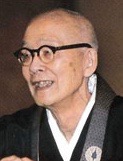
Buddhist scholar Daiei Kaneko represents a modern understanding of Jodo Shinshu Buddhism, although he’s not widely known in the West. An e-book, “A Thinking Person’s Guide to Shin Buddhism,” captures his thinking and helps explain Shinshu in contemporary terms.
Kaneko (1881-1976) followed in the footsteps of his teacher, Manshi Kiyozawa, and other Higashi Honganji thinkers such as Ryojin Soga, Haya Akegarasu, and Rijin Yasuda, who debated, wrote, and in some cases, were excommunicated by the Shinshu Otani-ha denomination around the early 1900s. They are credited with relating Shinran Shonin’s teachings to contemporary thought through various means, including what I see as borrowing from psychology, logical reasoning, and personal experience. Kaneko taught at Higashi’s Otani University but was kicked out in 1928 after accusing the denomination of being too materialistic. He was later reinstated and now his work is respected and studied.
Like fellow disciples of Kiyozawa, Kaneko deeply explored the meaning behind Shinshu’s words and teachings, casting aside traditional Shinshu terminology, concepts and doctrine taken at face value. He tried to reach an understanding that related to his life and times. Consequently, Kaneko’s writings are peppered with words common in Western philosophy, but new to the explanation of Shinshu.
In the book, Kaneko talks about human misery, but that the solution lies not in eliminating suffering, rather by acknowledging and transcending it. Only then can there be peace of mind. He writes, “Although engaged in the madness of human life, we can live with peace and composure. In this sense, Pure Land is a stately realm imparting a higher dimension of reality.”
Jodo Shinshu is a teaching characterized by Nembutsu, reciting Amida Buddha’s name, “Namu Amida Butsu.” Kaneko addresses how he sees the dynamic of Nembutsu working in a person’s life.
He quotes Kiyozawa, “The basis for religion is reverence arising in man standing before the Absolute, realizing his limitations, and taking refuge in the Infinite.” In taking refuge, Kaneko points to how one’s mind becomes settled, which I interpret to mean what is traditionally explained as “realizing that one’s birth in the Pure Land is settled.”
Thus Kaneko says, “Pleased our birth is settled, Buddha Name flows from our lips.” “Buddha Name” means Nembutsu, the reciting of “Namu Amida Butsu.”
Shinran Shonin taught the difficulties of pursuing a self-effort path towards spiritual liberation through discipline, asceticism, scholarship and self-denial, which Kaneko calls the “Path of Holies.” As the argument goes, such a path is severely limited and not open to most people. Kaneko writes, “Although Path of Holies may be fundamental in Buddhism, there would be no path for common people without Pure Land. That is why Pure Land patriarchs treasured the teachings.”
For everyone, human ignorance still is a root problem. Kaneko writes, “Is ultimate truth an existential reality only for a chosen few? ‘Alas, what I know is without use; what I must know, I know not!’ In a crisis, such is the lament of the wise.”
For newcomers, this book is difficult in parts but contains nuggets of wisdom and insight. For students of Jodo Shinshu and scholars, this text is an invaluable resource.
Ultimately, Jodo Shinshu is a teaching for everyone, regardless of ability, gender, age, status and wealth. Any guide pointing us towards more deeply understanding the teachings is important.
Kaneko writes, “In Buddha Name of wisdom, Pure Land’s light shines even on our afflictions in daily life. When misery turns to joy, we smile amid tears… When voicing Buddha’s Name, life’s gates open; when forgetting Buddha’s Name, life’s gates close.”
(A Thinking Person’s Guide to Shin Buddhism, by Daiei Kaneko, published by Shinshu Center of America, 2015)
Rev. Yamada is editor of Shinshu Center of America and helped edit the book. (email: revkyamada@gmail.com)

